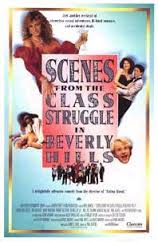
SCENES FROM THE CLASS STRUGGLE IN BEVERLY HILLS
US, 1989, 102 minutes, Colour.
Jacqueline Bissett, Ray Sharkey, Mary Woronov, Robert Beltran, Paul Mazursky, Ed Begley Jr, Wallace Shawn.
Directed by Paul Bartel.
Scenes from the Class Struggle in Beverly Hills is a film by Paul Bartel (Eating Raoul, Lust in the Dust, Not for Publication). It is an oddball, bawdy sex comedy set amongst the filthy rich of Beverly Hills. The title has echoes of Ingmar Bergman's film: Scenes from a Marriage, Smiles of a Summer Night (and the various films derived from these stories liked A Little Night Music, A Midsummer Night's Sex Comedy). It also has the overtones of the bawdy classics of past centuries including Boccaccio's Decameron Nights or Chaucer's Canterbury Tales. However, this is probably dignifying the film far too much. It is an oddball sense of humour that Bartel and his co-writer, Bruce Wagner, show. While there are many comic sequences as well as a genial tone about the film, it is a satire without much sharpness and bite. It opts for a happy ending and sweetness and light.
The cast is excellent: Jacqueline Bissett with fine sense of comedy, Ray Sharkey embodying the self-centred gigolo, Robert Beltran as the rather naive servant, Mary Woronov as the divorcee, Wallace Shawn as the eccentric gynaecologist, Paul Bartel himself at the dietician, the 'thinologist', Anisia Walker as the jovial black hooker, Ed Begley Jnr as the way-out playwright, Barrett Oliver as the crippled and dying young teenage son. Director Paul Mazursky also appears briefly as the ghost, Sidney.
The film is fast-paced, yet some of the satire falls flat - though, of course, it may hit the spot in Beverly Hills.
1. Satire and comedy, bawdy comedy and farce? Satire on people, Los Angeles and Beverly Hills, on the movies?
2. The world of Los Angeles, Beverly Hills homes, lifestyle? Musical score?
3. The elegance of the credits, the overtones of the title?
4. The author's point of view: spoof, satire, bite or not, the significance of the ending? Audience expectations of life in Beverly Hills?
5. The effect of the initial joke and its macabre tone, audiences believing that this really is the behaviour of Beverly Hills type, the irony that it was a joke, then that it was a dream? Sidney as a ghost haunting Clare? Reality and unreality? Disorienting the audience response? The styles of behaviour, dialogue, implausibilites and complexities of plot? Coincidences? The happy ending?
6. Clare as the centre of the film, the initial joke and her behaviour, Sidney still at the table, the memories of her sitcom career, friendship with Lisabeth, talking with her, her relationship with Zandra? Sidney's various appearances and discussing their married life, wanting to stay with her? Her own life, manners, sexuality? The wake and her behaviour? Peter and To-Bel?, the watching of the video? The lights out? Peter and his play and the rehearsal? Relationship with Frank? Relationship with Juan? Spending the night with Peter? Breaking with him? Frank and his propositions? Sidney and the dog? Her leaving, wanting some time for herself? The zaniness of the interview with the reporter - and Howard making all the revelations at the table?
7. Lisabeth and Howard, her participation in the joke, the elaborate fumigation of the house, Willi and his illness and dying, piano-playing? Taken aback with Peter and To-Bel? Taking them all to Clare's for the weekend? Listening to Clare, her relationship with Frank? Her knowing the truth about Howard and To-Bel? Her concern about her son? Juan's approach, spending the night with her? Showing Howard Juan in the bed? The talk with Howard? The reconciliation with Juan and going off with him?
8. Frank as servant, his exhibitionism to Juan about sex, discussions with Juan, his art, the bet, his life as a gigolo, relationship with Zandra, sex with To-Bel?, his faking the encounter with Clare, spending the night with Juan and winning the bet, the end and his giving the money to Juan?
9. Juan and the initial joke being his dream, servant, the debt, relationship with Frank, the wager, being around, Lis and the relationship, his allowing Frank to think he had lost the bet out of respect for her, his night with Frank and attitude towards homosexual behaviour, the paying of the debt, going off with Lisabeth?
10. Peter, the playwright, the few performances of his play, Las Vegas, meeting To-Bel?, the irony of his lines, especially about marriage, the styles of his plays, rehearsing with Clare, spending the night with her, the clash with To-Bel?, reconciliation?
11. To-Bel?, the arrival, the black woman, Las Vegas, the encounter with Frankie, the encounter with Willie, the video, turning out the lights, the past with Howard, with him? Going off with him?
12. Willie and his illness, pathos, playing the piano, his infatuation with Zandra, sex-obsessed, Juan and the videos, watching them, seeing To-Bel?, the sexual encounter with Rosa? His staying on?
13. Rosa, participation in the trick, her eccentric phrases, the voodoo-like incantations, her pushing Juan to Lisabeth? With Willie?
14. Howard, his practice, his size, leaving Lisabeth, the experiences with To-Bel?, the night with her, his revealing everything at the table and embarrassing everyone?
15. Mo, his dog, the thinologist, the Noel Coward style, his advice, the death of the dog, the wake for the dog, the proposition to Zandra and going off?
16. Zandra, attitudes towards her mother and father, to the wake, her relationship with Willie, with Frank, her disillusionment, off with Mo?
17. The blend of comedy, bawdy farce, satire?